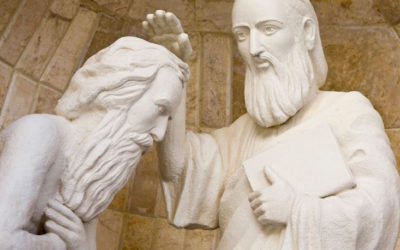by M. E. Stortz
As the seminar began, the speaker rushed to the podium, looked around wildly, and asked: “What time is it?” Some of us reached for our phones. Others checked their watches. Still others assured her she was not late. “No,” she said, now calm and at the podium: “What time is it?” As she repeated the question over and over and over again, we identified various ways we mark time.
Sometimes time moves in a straight line. As I write this, it is 12:41 p.m., Sunday, June 21, in the year 2020. It will never be this time again. No one can return to being 24-years old once they’ve passed that age, even if they’d want to. As a citizen of Minneapolis, I wish I could go back to May 24, 2020, when George Floyd was still alive. But there’s no returning. Chronological time marches forward without looking back.
Other ways of marking time move in circles. Seasons make an annual circuit, and they organize the lives of people who live off the land. Summer follows spring like harvest follows seed-time. Liturgical time has its weekly and yearly rounds. The Saturday Sabbath ends the week for Jews, while Sunday begins the week for Christians. Rosh Hashanah begins the new year for Jews; Advent, for Christians. Passover and Easter roll by every year.
A dying friend once confided that he kept only liturgical time. He knew his clock was literally running out. In keeping time that was cyclical, he fantasized about circling back to the time before his illness. “I won’t beat this cancer,” he said. “But I can’t live from treatment to treatment.” He found hope in seasons pegged to death and resurrection. Cyclical time spirals forward.
What kind of time do you keep? And does it even matter? The biblical response is an urgent “Yes!” The psalmist begged for counsel: “Teach us to count our days that we may gain a wise heart” (Psalm 90:12). Centuries later, Jesus echoed that same urgency as he proclaimed, “The kingdom of God has come near to you” (Luke 10:9). Here Jesus isn’t talking about the kingdom as a physical place, as in “take a right turn at the next crossroads and follow the signs to ‘The Kingdom.’” He’s not even talking about a particular reign, like that of Great Britain’s Queen Elizabeth II. In announcing the coming of God’s kingdom, Jesus alludes to a different way of marking time entirely. In Jesus, the kingdom of God comes near not in a realm or a reign, but in a person. And not just any person: Jesus comes as the Son of God, who brings God’s time into human history. The apostle Paul puts it this way: “But when the fullness of time had come, God sent his Son, born of a woman, born under the law, in order to redeem those who were under the law, so that we might receive adoption as children” (Galatians 4:4-5).
Telling God’s time doesn’t depend on an iPhone, a watch or a liturgical calendar. Nor should God’s kingdom be solely identified with an earthly place, movement or group. Attempts to limit the place of the kingdom of God count as idolatry. This side of the resurrection, no one has the keys to God’s kingdom and no one has the device that will calibrate God’s time. If Jesus brought God’s kingdom into human history, then the best way to keep God’s time is to follow God’s Son. In concrete terms, that means living by his Spirit—that is, being animated by the Spirit of God in Christ Jesus.
Now there are a lot of “spirits” out there: the spirit of capitalism, the spirit of racism, the spirit of consumerism, the spirit of greed, the spirit of addiction. Later in his letter to the Galatians, the apostle Paul tells the community how to recognize the Spirit of God in Christ Jesus: “The fruit of the Spirit is love, joy, peace, patience, kindness, generosity, faithfulness, gentleness, and self-control” (Galatians 5:22- 23). Wherever Christians see these dispositions at work, they know that the kingdom of God is near. Whenever Christians act out of these dispositions themselves, they enter—if only for a moment—God’s time.
M. E. Stortz is the Bernhard M. Christensen Professor of Religion and Vocation at Augsburg University in Minneapolis. She the author of Called to Follow: Journeys in John (2017).
This article is from the October 2020 issue of Gather magazine. To read more like it, subscribe to Gather.
Ananias all along
by Julia Seymour— In Damascus there was a certain disciple named Ananias. The Lord spoke to him in...
Letters and the Gospel
by Heidi Haverkamp— My mother taught me to be to be a letter writer. She and her mother, my...
Safety is not always the better way
by Michelle DeRusha— Recently I re-read Matthew 4, where Jesus calls fishermen Peter, Andrew,...






Loved it!
I am pleased to have these articles which “stand out” in Gather. I can refer back to these & the hard copies With my magazine subscription which is so appreciated.
I have been searching for what I once saw as how to get a PEN PAL. Thank you for resending that information to: Lucille Loftesnes, Lucille.loftesnes@gmail. Com.